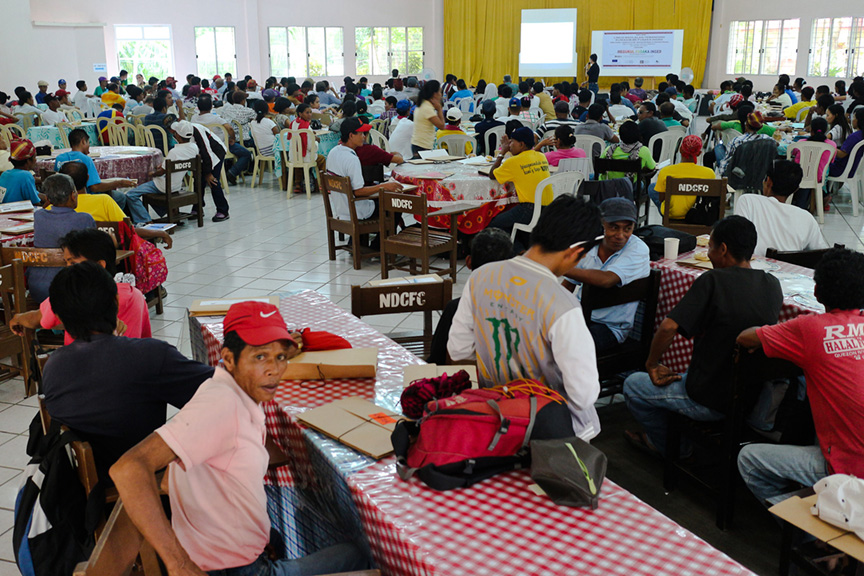DAVAO CITY (MindaNews / 24 Aug) – Around 400 tribal leaders from all over Mindanao will convene in a three-day assembly here to discuss the issues concerning the Lumads within the Autonomous Region in Muslim Mindanao (ARMM) and come up with legislative proposals that they hope Congress will incorporate in the new Bangsamoro Basic Law (BBL).
 Lumads gather to discuss Bangsamoro concerns in Maguindanao in 2013. Mindanews file photo by POP SALAHOG
Lumads gather to discuss Bangsamoro concerns in Maguindanao in 2013. Mindanews file photo by POP SALAHOG
The Mindanao Indigenous People’s Legislative Assembly (MIPLA) will take place at the Mergrande Ocean Resort, Talomo District here from Aug. 30 to Sep. 1.
Datu Lipatuan Joel A. Unad, chairman of the Mindanao Indigenous Peoples Conference for Peace and Development (MIPCPD), said during the “Wednesdays Habi at Kape” that they will discuss the lumads’ “four bundle of rights” that consist of right to govern their ancestral land, right to governance, right to economic development, and right to integrity and justice system.
Under the new BBL, he said they want that the rights of the lumads within Bangsamoro entity will be protected and recognized in accordance to their customary laws and cultural practices.
The passage of the new BBL, which is an enabling law to implement the 2014 Comprehensive Agreement on the Bangsamoro (CAB), will pave the way for a new Bangsamoro government that will replace the ARMM.
“It is necessary that Congress must heed our call, not only through mere statement but also through actual policy and actions,” Unad said.
The objectives of the event include to surface non-Moro IP-related issues and concerns relative to the proposed BBL; suggest possible “enhancements” to the draft law, specifically those that will impact on the rights/welfare of Mindanao’s non Moro-IPs; enable members of the Tribal Legislative Assembly to interface with representatives of the BTC; and submit legislative proposals that will mirror the views, dreams and aspirations of Mindanao’s non-Moro IPs, and be reflected in the proposed BBL.
Non-regressive BBL
Lawyer Reuben Dasay A. Lingating, chair of the newly-created government-Indigenous People (GRP-IP) peace panel, said they support the creation of the new Bangsamoro government but it should be “non-regressive” in the recognition of their rights, in the protection of their interests, and in the promotion of their welfare.
He said the would-be Bangsamoro government must also be beneficial to the development of the lumads.
“By non-regressive, we should not in any way, through any act of legislation, diminish what the non-Moro IPs have right now. Otherwise, they will be unjustly differentiated from the rest of the Mindanao IPs who are enjoying their rights under the protection of existing laws,” Lingating said.
He said the MIPLA will serve as a platform for “non-Moro IPs to present their views and aspirations and hopefully, have these incorporated into the draft BBL.”
“We want to avoid a situation where there will be a ‘confrontation’ in Congress between the two parties. MIPLA will thus provide a platform for a new process of engagement which we can use to avoid the untoward experiences we had in the past with the previous version of the BBL,” he said.
Citing Republic Act 8371, or the 1987 Indigenous Peoples’ Rights Act (IPRA), Lingating lamented most of lumad territories in the Bangsamoro have not yet been acknowledged as “ancestral domain” even 20 years after its passage.
RA 8371 ensures that rights of indigenous cultural communities/indigenous peoples are recognized, protected and promoted.
It also created the National Commission on Indigenous Peoples (NCIP), the primary government agency responsible for the formulation and implementation of policies, plans and programs to promote and protect the rights and well-being of the ICCs/IPs and the recognition of their ancestral domains.
Lingating said the lumads fear these rights will not be clearly defined when Congress passes its version of the new BBL.
He said they did not have the chance to participate in the peace tables opened by the government (GPH) implementing peace panel to get inputs from different sectors because the draft BBL that the 20-member Bangsamoro Transition Commission (BTC) crafted was almost complete when the GRP-Lumad peace panel was formed last April 26.
Lingating said they invited Senate President Aquilino Pimentel III, Senator Nancy Binay, North Cotabato’s second district Representative Nancy Catamco (who chairs the Indigenous Cultural Communities and Indigenous Peoples committee), and Davao del Norte’s first district Representative and Speaker Pantaleon Alvarez to attend the MIPLA to receive the legislative proposals.
Although the draft BBL was already finished and is now in Congress, he said BTC members and the Tribal Legislative Assembly can “still confer with one another, and eventually, find a viable political settlement for all non-Moro IP related concerns that need to be addressed and reconciled.”
“The expected main output of the MIPLA are formal legislative proposals. What we have done during previous meetings of the MIPLA drafting committee is to identify the BBL’s contentious provisions, suggest possible revisions to them, and provide justifications for making such proposed changes,” Lingating said.
He added they want “to make sure that all emerging non-Moro IP related issues are not suppressed and brought into the open. We need to allow the real issues and concerns to surface so that we can finally participate in the process of nation-building.” (Antonio L. Colina IV / MindaNews)
